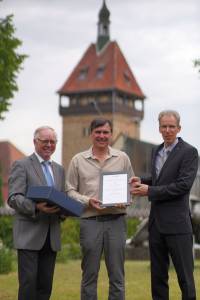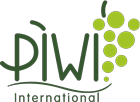"Pioneering Wines (PIWIs) - Innovation and Tradition"
This was the motto of the 13th International Symposium on Grapevine Breeding and Genetics, held from July 10-17 in the Art Nouveau Hall in Landau, Germany, where renowned breeding researchers and those involved in breeding and refining met.
The event was held under the patronage of the German Federal Ministry of Food and Agriculture (BMEL) and the International Organization of Vine and Wine, OIV for short. The dedicated team of the Julis Kühn Institute organized a varied and exciting program of lectures, discussions and excursions, which of course included the gala dinner on Thursday evening.
Peter Morio Prize for Vine Breeding goes to Prof. Dr. Jochen Bogs from the Neustadt Wine Campus

Peter Morio Prize for vine researcher from Weincampus Neustadt: from left Prof. Dr. Reinhard Töpfer (head of JKI vine breeding), award winner Prof. Dr. Jochen Bogs and Dr. Andreas Kortekamp (2nd chairman, sponsors and friends of the Institute for Vine Breeding Geilweilerhof eV © J. Fuchs/JKI
Press release from the Julius Kühn Institute (JKI) – Federal Research Institute for Cultivated Plants No. 10 from July 5th, 2022
The Friends of the JKI Institute for Vine Breeding honors the scientist for his outstanding research on disease-resistant grape varieties, among other things.
(Siebeldingen) Jochen Bogs was awarded the Peter Morio Prize 2022 for his outstanding scientific contribution to vine breeding. Prof. Bogs teaches at the wine campus in Neustadt, among other things, on the physiology and biochemistry of the vine and grapes, biotechnology, vine breeding and vine nutrition. His numerous publications speak for his excellent scientific networking in Germany and abroad. His expertise is valued worldwide. The prize is awarded by the community of sponsors and friends of the Geilweilerhof Institute for Vine Breeding. The Institute for Vine Breeding at the Geilweilerhof site in Siebeldingen belongs to the Julius Kühn Institute (JKI), the Federal Research Institute for cultivated plants. The award was presented on June 3rd at the association's annual general meeting.
In his laudatory speech, the head of the JKI vine breeding and managing director of the association, Prof. Dr. Töpfer, Prof. Bogs for his achievements. Jochen Bogs is currently researching the mechanisms with which fungus-resistant grape varieties (PIWI) defend themselves against harmful fungi. Another focus of his research is the ingredients of the berries and their influence on the quality of the grapes. He is currently working with the vine breeders and vine protectors of the JKI in the VITIFIT project: "Healthy vines in organic viticulture through research, innovation and transfer" together. Further joint research projects have been applied for.
Many milestones have been reached - the VITIFTI joint project has now been running for almost three years.
VITIFIT – Status quo in the third year of the project
The joint project VITIFTI has now been running for almost three years. The focus is on the pathogen of downy mildew, Plasmopara viticola. In the Freilandsaion 202, more demo wineries are to be integrated. The review of innovative approaches to copper minimization is one of the core elements of the VITIFIT project. Prof. Dr. Beate Berkelmann-Löhnertz and Dipl-Ing. Stefan Klarner, Hochschule Geisenheim University, show the current project status.
… PIWIs in focus
The use of PIWIs in organic viticulture practice will be the most effective way of reducing copper applications in the future, because the number of treatments can be reduced to three to four with PIWIs. So, growing PIWIs offers great potential for copper minimization...
Continue reading (PDF German)
Source: THE GERMAN WINE MAGAZINE 18.6.2022
Divico wines blended with Pinot noir - good quality and intense colour
Divico, Agroscope's new disease-resistant grape variety, is valued for the quality of the wines made from it. Assemblage trials with the Pinot noir variety have shown that Divico is suitable for correcting color intensity.
With an area of almost 3900 ha in 2020, Pinot noir is the most commonly cultivated variety in Switzerland. It is widespread in all wine-growing regions north of the Alps. The good reputation is based on the fine and typical bouquet of its wines, which is characterized by fruity notes and a good structure as well as very delicate and velvety tannins. Visually, the color intensity is sometimes judged to be a bit weak. Dyer grapes such as Dakapo and Dunkelfelder are therefore cultivated in Switzerland, and their wines are used in low-percentage blends to improve the color of Pinot noir. With the first red grape variety developed by Agroscope and approved in 2013, which is resistant to downy mildew and powdery mildew as well as gray mold, another variety is available that is suitable for this purpose.
20 years of PIWI Valais
On May 28th and 29th, 2022 we celebrated 20 years of IG PIWI Wallis!
The extensive program started on Saturday with a visit to the World Nature Forum in Naters and welcoming the participants in bright sunshine below the Naters Fortress. Then we went into the underground passages with a visit to the fortifications. Michael Hänzig designed the introduction to the PIWI topic with the topic PIWI red wine vinification, which could be further discussed at the subsequent raclette à discrétion with a wide variety of wines.
HIBERNAL FORUM 2022 in Šardice – Czech Republic
In the year of the 200th birthday of Gregor Johann Mendel, the founder of genetics, the Mendel Winegrowers' Association Šardice (Moravia) organized the 7th competition of wines from PIWI varieties. The presentation of the competition wines with specialist lectures in the morning took place on Saturday afternoon, May 21, 2022.
The complete catalog with the results of the competition wines is published at the following address: http://www.vinozesardic.cz/akce-2022/prehlidka-piwi-odrud-a-hibernal-forum
Climate change and sustainability are driving forces for changing varieties in a traditional market
Vol.:(0123456789)1 3Theoretical and Applied Genetics
https://doi.org/10.1007/s00122-022-04077-0
REVIEW
A cool climate perspective on grapevine breeding: climate change and sustainability are driving forces for changing varieties in a traditional market
Reinhard Töpfer1 · Oliver Trapp 1
Received: 27 October 2021 / Accepted: 7 March 2022
© The Author(s) 2022
Abstract
A multitude of diverse breeding goals need to be combined in a new cultivar, which always forces to compromise. The biggest
challenge grapevine breeders face is the extraordinarily complex trait of wine quality, which is the all-pervasive and most
debated characteristic. Since the 1920s, Germany runs continuous grapevine breeding programmes. This continuity was
the key to success and lead to various new cultivars on the market, so called PIWIs. Initially, introduced pests and diseases
such as phylloxera, powdery and downy mildew were the driving forces for breeding. However, preconceptions about the
wine quality of new resistant selections impeded the market introduction. These preconceptions are still echoing today and
may be the reason in large parts of the viticultural community for: (1) ignoring substantial breeding progress, and (2) stick-
ing to successful markets of well-known varietal wines or blends (e.g. Chardonnay, Cabernet Sauvignon, Riesling). New is
the need to improve viticulture ́s sustainability and to adapt to changing environmental conditions. Climate change with its
extreme weather will impose the need for a change in cultivars in many wine growing regions. Therefore, a paradigm shift
is knocking on the door: new varieties (PIWIs) versus traditional varieties for climate adapted and sustainable viticulture.
However, it will be slow process and viticulture is politically well advised to pave the way to variety innovation. In contrast
to the widely available PIWIs, competitive cultivars created by means of new breeding technologies (NBT, e.g. through
CRISPR/Cas) are still decades from introduction to the market.
…. read more
Table 1 A collection of 42 resistant cultivars available in Germany and France including the presence of different resistance loci against downy mildew (Rpv) and powdery mildew (Run and Ren) (colour table online) Side 3
PIWI Germany Video as part of the Rheinhessen Sustainability Award
PIWI International lives up to its name more and more!
After we received more and more inquiries from the USA and Canada about PIWI grape varieties, cultivation options and resistances, the board decided to arrange a zoom info meeting.
We informed everyone with whom we had been in contact so far, wrote to protective communities, interest groups and institutes and invited everyone to an online exchange.
The feedback was very encouraging and entirely positive and we were able to register over 40 registrations within a few days!
Many aspects and questions were discussed. ?
Who is PIWI International and in what structure do we work, with special reference to the regional and country groups. General information on PIWIs, breeding, suitability for the North American continent, potential and challenges was also addressed. Of course, with the note that our entire pool of knowledge is available to members.
Fortunately, two participants - each from the USA and Canada - agreed to take matters into their own hands, to be available as contacts for interested future members and to initiate a country group each
We remain in close contact with them and look forward to welcoming two groups of countries across the Atlantic to our international group, hopefully this year.
We are convinced that the topic of PIWIs will receive a great additional impetus, so that the potential PIWIs can offer for the future of viticulture is also recognized worldwide.
So if you have business friends in the USA or Canada who might be interested in supporting our project - please let us know, we'll be happy to put you in touch! communication@piwi-international.org
PIWIs are making their way into Spain – with local color!
PIWI International is on course for growth and our new regional group PIWI España is already emerging...
Our new member, the Catalan winery Albet i Noya, is once again a pioneer in the field: having pioneered organic viticulture in Spain in 1978, they are once again one step ahead of the development of the Spanish wine scene.
Since wine producer Josep Maria Albet I Noya first became acquainted with PIWIs in France in the late 90s, his spirit of research and his urge to implement this knowledge in his vineyards have raged in him.
Spain was - and will not be - spared from climate change. His will to experiment with resistant grape varieties was all the stronger.
(more…)
NEW ZEALAND WINEGROWERS SUSTAINABILITY REPORT 2022
To our industry, sustainability means growing grapes and producing our world-famous wines in such a way that we can do so for generations to come. The New Zealand Winegrowers Sustainability Report provides a snapshot of our sustainability journey.
AGROVINA press report
Agrovina 2022 - the balance sheet is mixed
After the leading Swiss trade fair for fruit and wine growing, which takes place every two years, was postponed from January to April due to the corona virus, a drop in visitors and exhibitors had to be expected. Now the fair took place from April 5th to 7th. We look back.
Agrovina in Martigny (VS) opened its doors for the 14th time. According to the organizers, around 12,500 visitors visited the 150 exhibitors at this year's Agrovina. If you look at the numbers, you have to speak of a significant decline: minus 4500 visitors, around 70 fewer exhibitor companies than in 2020. However, this trend was expected in advance, as after the announcement of the postponement, some well-known companies suspended their participation and April for many wine and fruit producers are already busy again. Nevertheless, it was a welcome opportunity for the companies involved to overcome the two-year corona lethargy and get back in physical contact with customers. As several operators unanimously believe, this was necessary in view of the uncertain price development in many areas.
Source: Obst- und Weinbau - Die Rote - Switzerland

